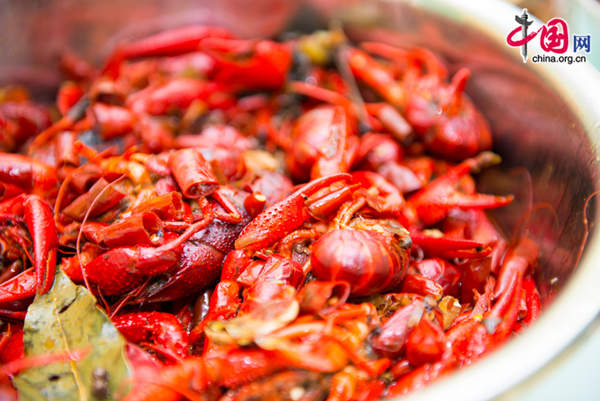A bite of lobster online
china.org.cn / chinagate.cn by Chen Boyuan, June 10, 2014 Adjust font size:
Many people in China use the online message service WeChat, and perhaps even more people love eating lobsters, but few have explored the business opportunities possible by combining the two.
 |
|
A bite of lobster online.[Photo / China.org.cn by Chen Boyuan] |
Zhang Qing had exactly this idea. As a "foodie" himself, Zhang said he loves all kinds of aquatic food, including freshwater crayfish, or lobster. But rapidly rising prices – lobsters now cost around 6-10 yuan (US$0.97-1.62) each – and a growing concern over food safety for those sold in small restaurants, made the online media practitioner determined to create his own lobster meals and start selling them on the Internet.
Besides placing orders over the phone and paying upon delivery, Zhang also encourages customers to book via WeChat, where orders can be paid for via online payment platforms – a convenience quickly gaining popularity among the young and highly educated population.
"I'm aware that many people around me, especially office workers, have similar concerns. Even though some people who do not really care about the price, they still worry about hygiene, including the environment in lobster restaurants, which are usually packed with customers and are rarely clean," said Zhang.
"Ghost" Street in the eastern central part of Beijing is a favorite destination for lobster lovers. In most reputable restaurants, lobsters are "sold by the ton on a daily basis," according to Zhang's preliminary market research conducted from December of last year to this April.
He said usually the demand for lobster rises along with the temperature in summer, partly because people have more parties in summer. "Spicy lobsters and cold beer make for a perfect party with friends," said Zhang, adding that the upcoming FIFA World Cup in Brazil will be another huge boost for his business.
Zhang admitted he is not the first person to turn to the Internet to sell lobster dishes, and that his determination to enter the business was partly because he thought the competition was not credible enough.
"Almost all of my competitors claim their dishes are made from fresh lobster, but I never see any fish tanks in their advertisements on WeChat and Weibo" Zhang said, explaining that without proper facilities, the aquatic animal is unable to stay alive for long.
Jumbo Crayfish's "delivery fleet," which now consists of three vehicles – a Land Rover Discovery, a Mercedes-Benz coupe and a Toyota Camry, is another publicity stunt he loves to show off.
The reason Zhang uses higher-end vehicles instead of cheaper vans, is to give customers a "deluxe experience." Customers who want to try his Internet lobsters are mostly trendy young people, who "would scream in surprise to see their lobsters arrive in a Land Rover SUV," said Zhang.
The company, which Zhang founded with two other partners, is not concerned about fuel costs. But instead of trying to find cheaper, petrol-efficient cars, the managers have insisted on boosting sales to cover the expenses. "A 100 percent satisfaction rate is our goal," Zhang said.
"Satisfaction also applies to food safety and its taste. We have agreed not to blindly take too many orders. We take only as many as our capacity allows for," he added.
Having a well paid full time job has already made him better off than most of his peers. Zhang said that he started his business to try something new, and give his retired father, now a "culinary supervisor" at Jumbo Crayfish, a chance to share family recipes, and ultimately, a dinner table always full of delicious lobsters.


